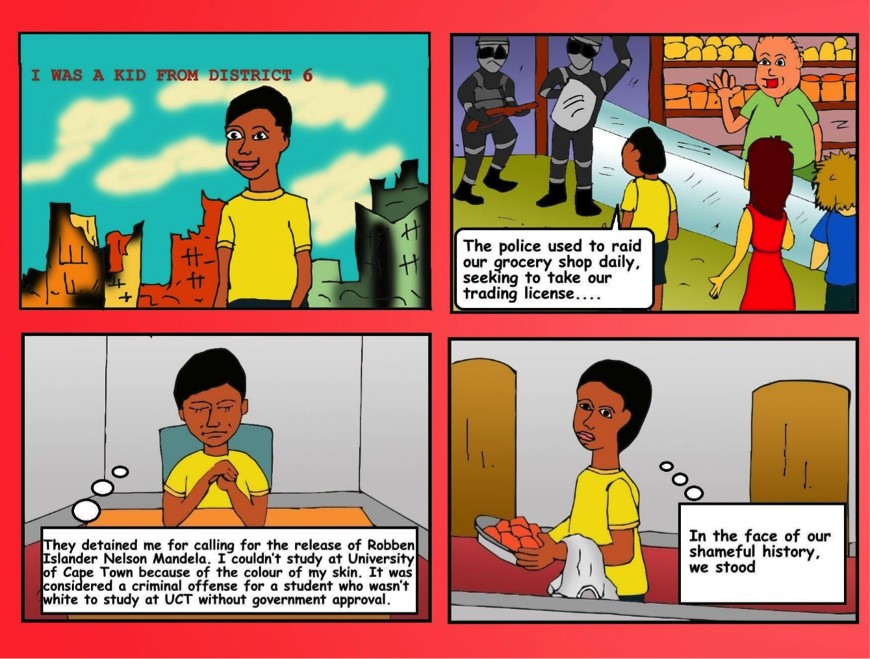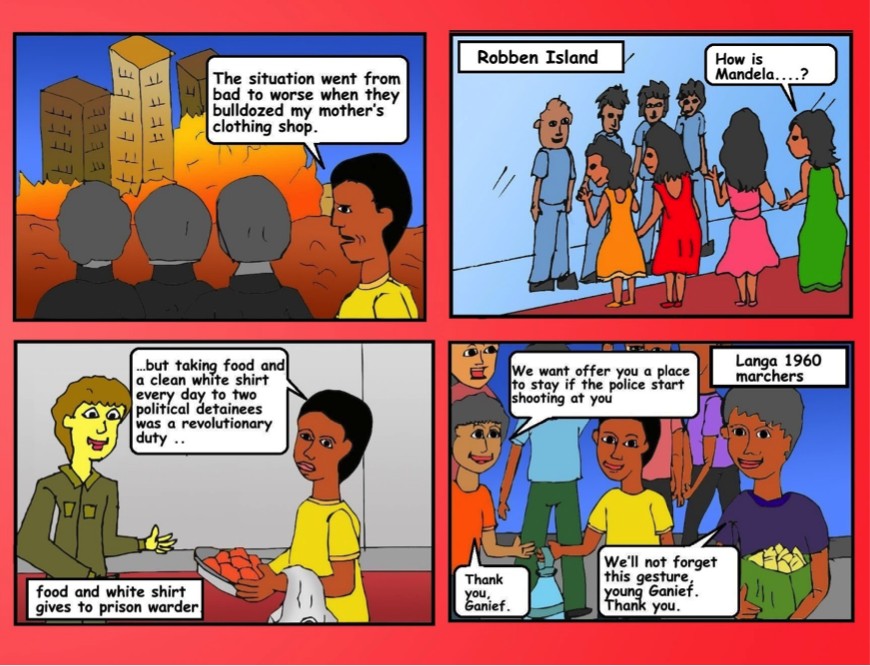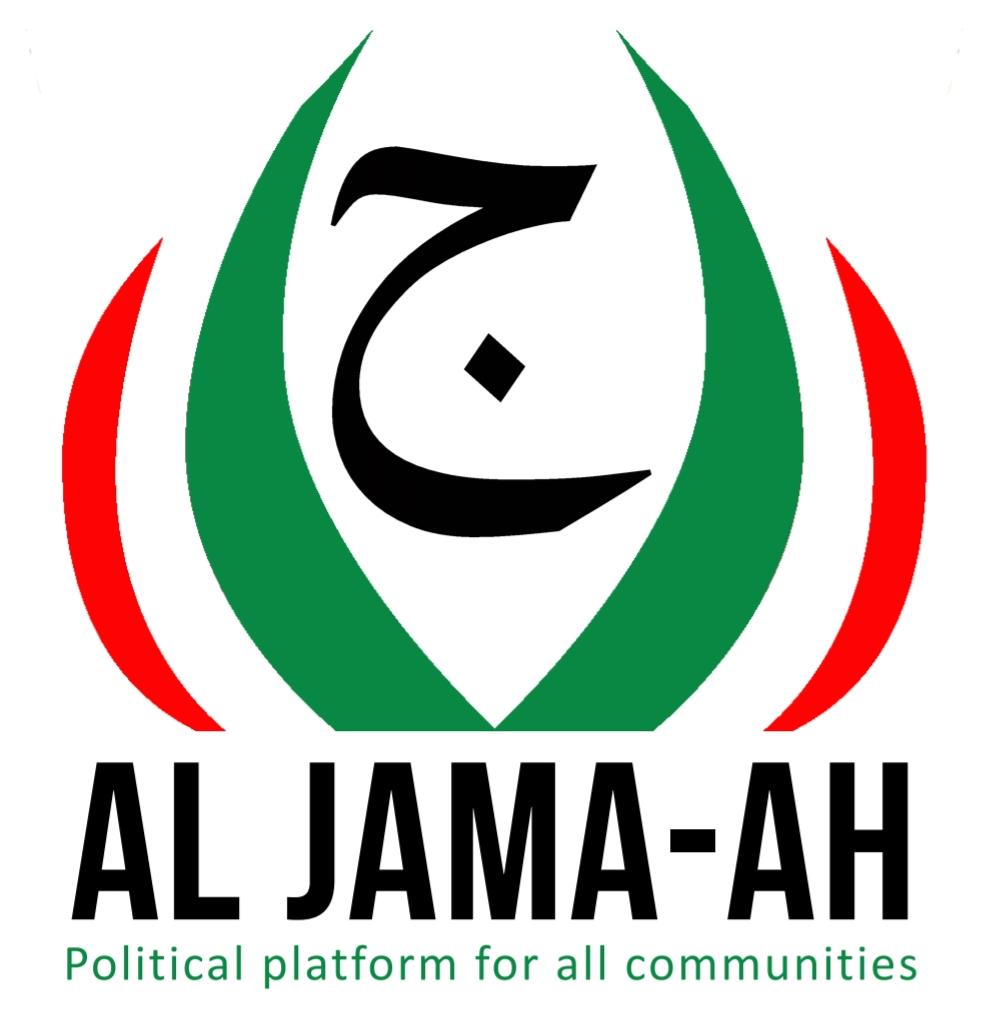Meet Ganief Hendricks
HONOURABLE LEADER of the Al JAMA-AH PARTY

BIOGRAPHY OF HON. M.G.E HENDRICKS
Mogamad Ganief Ebrahim Hendricks was born and raised in District Six.
He is the Leader of Al Jama-ah party he founded in 2007. Al Jama-ah is the only Muslim political party to have obtained a seat in Parliament. Mr Hendricks is a tsaunch sunni who learned his Aqeeda from the best Ulema.
He was exposed to politics at a very young age by his activist mother, Gairooneesa Ally Hendricks. His deceased parents were Imam Shaikh Ebrahim Latiff from Durban and Ghairoenisaa who was also known as Mrs Shaikh. During the 1960s the Latiff family was forced to change their surname to Hendricks to avoid being deported to Natal. Hendricks maternal and paternal grandparents hailed from Johannesburg where they were anti-apartheid activists.
As a young boy he accompanied his mother on visits to political prisoners and meetings. Often, he had to give up his bed to “visiting” political activists on the run from the security; and to the Gogos who travelled to Cape Town to visit their loved ones incarcerated on Robben Island.
Education:
– Chapel Street Primary School and Trafalgar High School in District Six
– BA Hons degree in Industrial Psychology at the University of the Western Cape (UWC).
– Founded the university’s first newspaper, “Unibel” and became its editor.
Community activities:
– A founding member of the Muslim Students Association (MSA)
– Executive member of the Majlis-us Shura Al Islami
– A campaigner for free education
– Free Nelson Mandela Campaign
– Vice-chairperson of the Forum for Black Journalists
– General secretary of the trade union for workers with sensory disabilities.
– Cricket manager in non-racial sport
– Played rugby, athletics, table tennis and chess.
Professional career:
– National Industrial Relations specialist for Nestle
– Founder and director of MWEB and its HR Director
– Received 2002 award from Naspers as “Pioneer of the Internet”
– After retirement did pro-bono work for the trade union and secured a provident fund for workers for disabilities.
– Taught at a primary and high school and lectured Industrial Psychology at Cape Technikon and UWC.
– One of the founding members of the Muslim radio station, Radio 786 and was instrumental in securing its broadcast licence.
– Prior to becoming a MP, he was a Councillor in the city of Cape Town
In Parliament he serves on the following Portfolio Committees:
– Small Business Development
– Joint Standing Committee on Intelligence
– Labour and Employment (alternate member)
– Health (alternate member)
– Home Affairs (alternate member)
– International Relations and Cooperation (alternate member)
– Justice and Correctional Services (alternate member)
– Standing Committee on Public Accounts (alternate member)
LEARN MORE ABOUT AL JAMA-AH


I was a Kid from District Six
a cartoon of my life, by Ganief Hendricks
Sixty years of resistance against an unjust system of apartheid and oppression in South Africa is what inspired the author, Mogamad Ganief Ebrahim Hendricks to follow in the footsteps of Sheikh Yusuf and the legacy of the author’s great grandfather Hajee Ozeer Ally.
The author’s own struggle against unjust laws in South Africa has been deeply inspired by Sheikh Yusuf’s resistance to Dutch occupation of the East Indies and the role his great grandfather played against apartheid.
Sheikh Yusuf, his family and followers were all exiled to Ceylon for resisting Dutch occupation. They were later banished and exiled to the Cape of Good Hope in 1694. Sheikh Yusuf brought Islam to South Africa and is highly revered by local Muslims as the pioneer of Islam in the country.
Hajee Ozeer Ally is known to have given the name of one of South Africa’s major liberatory movement, the African National Congress (ANC) who is also now the ruling party in the country. The author emphasises that the defining inspiration came from his mother, the late Ghairooneesa Hendricks, nee Booley code-named Mrs Shaik. This feisty woman had two safe houses, one at her home at 114 Rochester Road and the other at her dressmaking shop in the most famous area of District Six known to all as The Draai Docks.
The wives and relatives of the Rivonia Treason trialists and other political prisoners held on Robben Island, stayed at her safe houses. Mrs Shaik also housed members from liberation movements across the political spectrum. When veteran PAC (Pan Africanist Congress) activist Yasien Mohamed was deployed by the PAC from a remote rural area, De Aar to Cape Town, all he had was an address written down as 114 Rochester Road.
The author puts to rest as to who started the armed struggle, the ANC or the PAC. He reveals the real breakdown between Robert Mangaliso Sobukwe and Nelson Rolhlahla Mandela over the Freedom charter and the surprise of African Presidents when visited by Oliver Tambo of the ANC and not Robert Sobukwe who they viewed as the leader of the struggle for liberation in South Africa.
The constant accommodation of political prisoners’ relatives and political activists at the two safe houses, were events and history the author learned and while still a kid in District Six he was already rubbing shoulders with the ‘thought leaders of the resistance movements.’
Ganief, as commonly known by his middle name, was born during the defiance campaign against apartheid and from 9-years-old his mother was his handler. He recalls how the first signs of underground plans for an armed struggle surfaced in his home in District Six. District Six became the hub of the resistance as the ‘thought leaders’ were living and studying at the nearby universities. These leaders included Doctor Archie Mafeje, Judge Fikele Bam, Philip Skosana and others.
Ganief started his schooling at the Chapel Street Primary School and attended Trafalgar High School but completed his matric at Harold Cressy High School. He obtained both his B.A. degree in History and Sociology and his honours degree in Industrial Psychology at UWC.
He worked for 18 years at Nestle as a Regional Personnel Manager and National Industrial Relations Specialist. At Mweb (Multichoice) he worked for 10 years as a Human Resource Director. He lectured at UWC and the Peninsula Technikon, taught at Mount View High School in Hanover Park, Bridgetown High School in Athlone,
Rosedale Primary and Easter Peak Primary Schools. He served as chairman of the Management and Leadership Development Association (Malda) in Langa.
Ganief is the recipient of an award as a ‘Pioneer of the Internet’ and he was the founder and president of the MSA; chairman of Radio 786 and director of Seriti Sechaba Publishers; president of AL JAMA-AH, the only Muslim political party elected to Parliament and he serves as the party’s Member of Parliament. Prior to taking up the MP position, he served as the party’s councillor in the City of Cape Town.
The autobiography skilfully espouses his role at the higher institution of learning for Coloureds, University of the Western Cape (UWC) which he helped to transform from being known as a “bush college” to a prestige university. This learning propelled him in the corporate world against all odds including job reservation and the Group Areas Act to get an award as a pioneer of the internet by South Africa’s No 1 JSE listed company.
He excelled in labour relations and later when he became secretary of a trade union he won a landmark case on equal pay for work of equal value. He also won the first discrimination case against women workers in terms of the anti-discrimination clauses in South Africa’s new Constitution and Bill of Rights. He the right of workers with disabilities to receive a pension fund and won workers’ rights for obese women.
The author offered labour law rights to listeners of three generations on the Cape Flats which was broadcast on a community radio station. While at UWC, the first democratically elected president, Nelson Mandela’s chief of staff was his news editor of the campus newspaper where he served as editor in chief. His passion for Islam drove him to form the Muslim Students Association of South Africa (MSA).
While still a student, he also served as an official of the most leading Muslim bodies in South Africa.
Later he became one of the founder members of the Muslim community radio, Radio 786 along with former Robben Islander Imam Achmad Cassiem and Fatima Haron daughter of Imam Abdulla Haron who was killed in detention without trial in 1969. He hosted via satellite in the radio’s studio, the extinguished leader of Hamas, Sheikh Ahmed Yassin and welcomed the Nation of Islam’s executive member, Louis Farrakhan from America when he visited Radio 786 for an interview.
Ganief Hendricks was vice-chairman of an organisation which consisted of 300-strong affiliates of Muslim organizations who called for a boycott of South Africa’s first democratic elections in 1994. But he then decided to cast his vote and later formed his own Muslim political party. When South Africa reached 25 years of democracy, the World Bank reported in 2018 that the country is the world’s most unequal society. Ganief commented on the findings and referred to SA’s freedom as rather ‘cosmetic’ and called for the restoration of land without compensation.
Ganief is currently President of AL JAMA-AH and is the party’s Member of Parliament, a definite “voice for the voiceless” as he continues to champion for justice and the true liberation so many sacrificed their lives for.
He is married to Fatima Hendricks (Sedick) and they have three sons Jihaad, Ismail and Aziz as well as a daughter, Ghairoennisaa, named after his late revolutionary mother. He has seven granddaughters Aqila, Ra’eesa, Layla, Layaan, Haadiyah, Misha and Zia as well as four grandsons Laeeq, Jawaad, Fahad and Deen.
Selected titles by author: Ganief Hendricks
Teachers have Rights Too.
I was a kid in District 6 Chapter. Available on Kindle – Amazon.
Shaken. Equal pay for equal work still a dream. Available on Kindle – Amazon.
Was our Freedom Fake. Available on Kindle – Amazon.
SUNGAI YANG UNTUK MENGHORMATI SYEKH DARI INDONESIA

